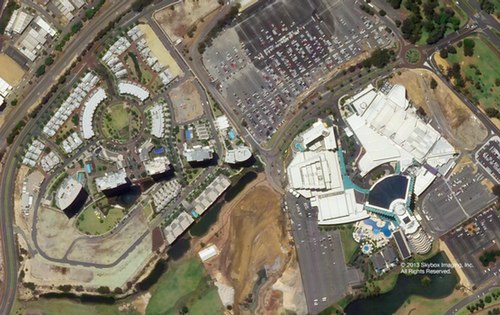
An image of the Crown Perth entertainment complex in Perth, Australia, taken by the SkySat-1 spacecraft shortly after its launch last year. Google is reportedly interested in buying the company. (credit: Skybox Imaging)
Skybox Imaging has blazed a number of paths in the commercial space industry, announcing plans a few years ago for a constellation of small commercial remote sensing satellites to provide high-resolution imagery, then going out and raising more than $90 million in venture capital. Now the company has attracted the interest of one of the most powerful companies in the world.
The Silicon Valley trade publication The Information [subscription required] reported Monday that Google was in “early talks” to acquire Skybox Imaging for an disclosed sum. Google would be interested in the company to access the high-resolution images the company’s fleet of satellites will provide. While Google currently relies companies like DigitalGlobe for imagery that goes into Google Maps and Google Earth, an in-house source may be less expensive in the long run for Google. Moreover, Skybox’s plans to be able to refresh its imagery quickly—daily or even multiple times a day, depending on the configuration of the satellite fleet—would allow Google to ensure its imagery is up to date.
While it’s too soon to know if Google will go through on the acquisition, it seems likely that Skybox will need additional funds to deploy its satellite constellation. Earlier this year the company announced a contract with Space Systems/Loral to manufacture its next 12 satellites, and a separate contract with Orbital Sciences to launch the first six of them on a Minotaur-C rocket. Since Skybox probably is not generating much revenue from its one satellite currently in orbit, the $91 million it’s raised to date is unlikely to cover the costs of fulfilling those contracts even if it hadn’t spent any of it yet.
The question for Skybox, then, is whether current or new investors are willing to put more money into the company to fund the development and launch of its satellites, or if those investors instead are looking for an exit—and a return on what they’ve invested to date—and letting Google or another company fund Skybox’s satellite system.

Leave a Reply